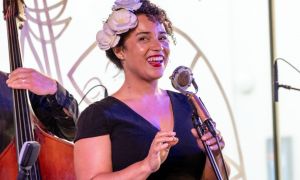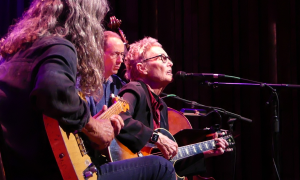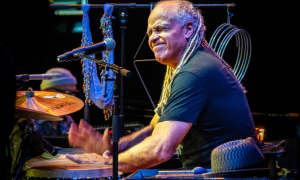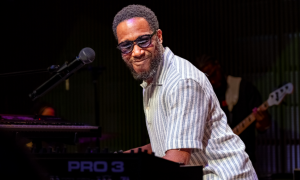Home » Jazz Articles » Live Review » Vilnius Mama Jazz Festival 2024
Vilnius Mama Jazz Festival 2024
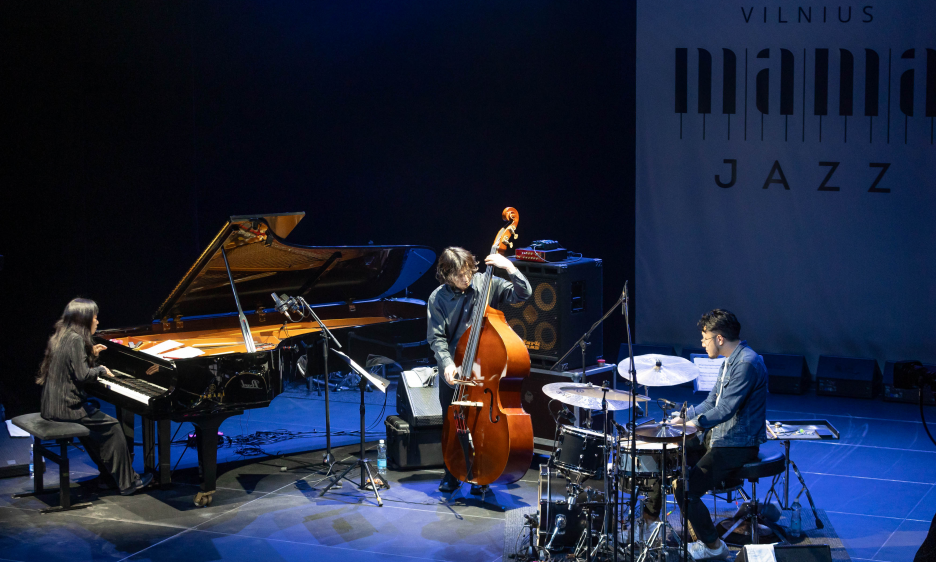
Courtesy Danius Labutis
National Drama Theater
Vilnius, Lithuania
May 23-26, 2024
Intro
As every year since 2002, the cosmopolitan Lithuanian capital Vilnius once again hosted the Mama Jazz Festival. While customarily booking acts that might please a wide range of music lovers, the bill this year was one of the strongest to date, with acts from Europe, the USA and beyond, along with a Showcase Stage offering new talent the chance to get noticed by an expert panel of overseas festival promoters, club bookers and journalists. The plush National Drama Theater, just off the main shopping drag, put on ten acts over four evenings, as well as a further ten in the free Showcase for Lithuanian Jazz spread across two afternoons.Jones Jones
Drummer
Vladimir Tarasov
drumsb.1947
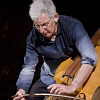
Mark Dresser
bass, acousticb.1952

Larry Ochs
saxophoneb.1949
Each of the mature talents involved boasts an impressive history. Dresser was the bassist in

Anthony Braxton
woodwindsb.1945

Rova Saxophone Quartet
saxophoneThey traded in abstract free jazz which prized spontaneous interplay over energy or pyrotechnics, yet also managed to suggest an underlying but mysterious logic to their exchanges. It is Tarasov in particular who gives this group its distinctive character. Although sitting surrounded by all manner of percussive devices, he utilized them sparingly with that wisdom which comes with age, focussing only on a limited array of sounds at any one time—a well-placed tympani boom here, or malleted zither droplets there—whatever seemed to best suit the moment. Such restraint also served to enhance the transparency and openness of the dialogue, allowing the fine detail of Dresser's high harmonics and bowing to ring out clearly.
Ochs similarly avoided grandstanding. In fact, his wavering, querulous tenor saxophone often added a mournful human dimension to the communion, his passion set out in lower case. Tarasov began one piece by alternating chimes with a simple snare pattern, straight away establishing an unusual space. Ochs wielded his sopranino saxophone to deliver what might have been an alien folk refrain, while Dresser interlaced arco creaks with the occasional reiterated surge. Only then did they meet the expectations of what a free jazz trio might do, becoming heated for the first time, Tarasov pursuing a steady forward momentum, while Ochs wailed over Dresser's fast walk.
When it seemed that the final number might be taking the same route, with Ochs dialing up the skronk on tenor and Dresser digging into what threatened to become a riff, it was Tarasov again who subverted assumptions, sustaining a spare open pulse on tambourine. Even for what might be perceived as a demanding presentation, the sold out crowd insisted on an encore.
Satoko Fujii Trio
Japanese pianist
Satoko Fujii
pianob.1958
Takashi Sugawa
bassIttetsu Takemura
drumsSugawa and Takemura brought an unruly exploratory attitude, even as they totally bought into the idiosyncratic universe demarcated by Fujii's writing, and she gave them ample opportunity to dive deep into the weeds. As a consummate improviser herself, no stranger to such pursuits, she responded by delving into the interior of her grand piano to extract unlikely but apt sonorities, whether by striking with a rubber mallet, pulling a string back and forth around a piano wire to bend a note, or by using one hand to modulate the tonality, while using the other on the keys. At other points, an introspective piano melody erupted into keyboard storm, as she rolled her hands onto her knuckles.
In one particularly memorable feature Sugawa drew on his entire instrument. He proceeded from flicking the strings below the bridge, to plucking buzzing harmonics, and tapping on the body of his bass in an enthralling display. He also revealed the sensitive side of his playing on the final number as he wielded his bow in a mercurial duet with the pianist that was full of light and shade. Then, a chain of staggered thematic material escalated first into a tumultuous exchange between Fujii and Takemura, and then a drum solo full of unexpected accented outbursts, which Sugawa accompanied on strident bamboo flute. The juxtaposition of improv sensibilities with more ordered elements in unpredictable trajectories was an alluring strategy which Fujii exploited to the full all evening.
Immanuel Wilkins Quartet
Young American saxophonist
Immanuel Wilkins
saxophone, altob.1997

Micah Thomas
pianob.1997

Kweku Sumbry
drums
Rick Rosato
bass, acousticb.1988
Thereafter the boundaries between tunes became blurred. Was that brief kick drum and ride cymbal feature a transition to another number or an integral part of the current one? Ultimately it did not matter as the set flew by in a whirl of incantatory motifs, gently soaring churchy ballads and braided lines. It almost seemed as if the opener was to demonstrate that, yes he could do that if he wished, but his preference was rather more nuanced. One intriguing juncture came during a prayerful foray for sax, piano and bass, which was suddenly interrupted by Sumbry's urgent clanging on the bell of a cymbal, like a fire alarm going off, before a return to the serene feel.
Elsewhere Thomas made wayward gestures at the keyboard, as if chafing at the bounds of form. In another episode Wilkins channeled

Charlie Parker
saxophone, alto1920 - 1955

Thelonious Monk
piano1917 - 1982
Rabih Abou-Khalil Group
Lebanese oud player
Rabih Abou-Khalil
oudb.1957

Charlie Mariano
saxophone, alto1923 - 2009

Kenny Wheeler
flugelhorn1930 - 2014

Glen Moore
bass, acousticb.1941
Closely packed in the center of the stage, the group's music was similarly densely woven, tight yet unrestricted at the same time. Joining him was American percussionist " data-original-title="" title="">Jarrod Cagwin , a fixture more than twenty years, and a pair of Polish string players,
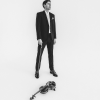
Mateusz SmoczyЁҪski
violinb.1984
Krzysztof Lenczowski
cello
Atom String Quartet
violinAbou-Khalil showcased dazzling prowess on the oud (a Middle Eastern lute), with bent notes that summoned the ghost of blues guitar and even pedal steel at times. His musicianship was matched by dashing string solos, bravura percussion and spirited rhythms. His dryly humorous announcements helped establish a convincing rapport with the audience who demanded an encore. He duly obliged with "Vlad," a song written in Bran Castle (aka Dracula's castle) in Transylvania, which once again emphasized the Balkan connection and gifted everyone one last solo.
Petter Eldh's Post Koma
Berlin-based Swedish bassist
Petter Eldh
bassb.1983

Gard Nilssen
drumsb.1983

Otis Sandsjö
saxophoneb.1987

Jonas Kullhammar
saxophoneb.1978
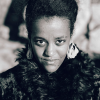
Sofia Jernberg
vocals
Christian Lillinger
drumsb.1984
At times it seemed the pair were in danger of disappearing into a rhythmic wonderland via a mix of fragmented beats that drove relentlessly but rarely directly. Eldh melded with Lillinger's precise stutter and dislocated accents. Although they brought a hip-hop flavor to non-metric playing and improvising, with the glitchy, perpetual morphing, there were no foot-tappers. Even at their most repetitious they constantly warped and stretched the meter. However, well used to the anarchic undertow, horns and voice continued unperturbed, draping extended unisons across the percussive crenellations. Most often Jernberg employed her voice wordlessly as an upper register extension to the reeds. Only occasionally did she blossom into the astonishing swoops, trills and whinnies for which she is so well known. Differing tenor saxophone approaches, with Sandsj? lighter and more prone to fractured overtones compared to Kullhammar's muscular post-bop mode, ensured variety and contrast. In particular, Sandsj?'s multiphonics intertwined winningly with Jernberg's vocal gymnastics, while Kullhammar's flute achieved a thicker more robust presence than normally expected from the woodwind.
Lillinger though was a delight to behold, flamboyantly brandishing an array of sticks and other implements in a finely detailed blur. The audience loved him too, much to Eldh's mock disgust. Their exploits meant there was always a whiff of jeopardy, a sense of flux even within the confines of the charts, which kept everyone on their toes, ensuring a set that was at once rigorous yet spur-of-the-moment.
Elsewhere on the Main Stage
American drummer and vocalist Jharis Yockley was at pains to point out that he and Japanese keyboardist BIGYUKI were not playing jazz. They were one of two late-night shows included in the festival this year (the other being the London-based duo
Binker Golding
saxophone, tenor
Moses Boyd
drums
Max Luthert
electronicsWeird Ugly Fish, the Lithuanian twosome comprising drummer Aiste Kalvelyt? and the electronics of Julius ?epuk?nas, was one of the highlights from the previous year's Showcase Stage. As a result, they were promoted to the Main Stage on the final evening of this year's event. Set up facing each other, they presented an evolving conversation punctuated by sudden fluctuations of course. Kalvelyt? answered ?epuk?nas video game beeps with hands pattering across her kit, before switching to sticks as the circuitry became more involved and dense. ?epuk?nas signaled imminent changes to the synthesized matrix, with Kalvelyt? instantly transforming her cadence in response. Her pile-driving drumming remains a big plus, as she toggled between intense primal thud, dub tattoos and more floating interludes. Their set was like passing through a series of adjacent raves, with barely a comedown in sight.
Also from London was seed. composer and saxophonist

Cassie Kinoshi
saxophoneb.1993
Shirley Tetteh
guitar, electricAyodeji Ijishakin
saxophone, tenorPatrick Boyle
drums
Idris Rahman
saxophone
Liran Donin
bass
Emre Ramazanoglu
drumsShowcase Stage
An enduring attraction of the Mama Jazz Festival is its promotion of Lithuanian musicians through a Showcase Stage held during the event proper. Ten groups took to the spotlight seeking to impress listeners who included promoters and journalists from around Europe as well as the general public. So popular was the free event, that there was hardly any unoccupied space in the smaller upstairs theater. The acts on show covered almost the entire spectrum of modern jazz styles, though there seemed a particular emphasis on electronics, with half sporting some type of plugged-in wizardry.Perhaps the most accomplished of these was the Vilnius Jjazz Ensemble, here manifest as a trio, although much larger sizes are available. This version consisted of three of the country's most seasoned performers, trombonist
Jievaras Jasinskis
tromboneBy way of total contrast, the Cinamono Duo was positively pared back: just double bassist Vytis Nivinskas and vocalist Laura Budreckyt?. She expressively sang a sequence of texts by Lithuanian poets with lyrical accompaniment from the richly gifted bass. By turns conversational, coquettish, exuberant, theatrical and vivacious, their arrangements were a big hit with the audience. While lack of fluency in Lithuanian was not an obstacle to appreciation due to their engaging brand of direct communication, if they were able to overcome the language barrier for listeners elsewhere, there would be no stopping them.
Pianist

Dmitrij Golovanov
pianob.1983
Outro
Every night in the National Drama Theater was virtually sold out, with the knowledgeable audiences enthusiastic not only for the more accessible fare, but also for the more challenging acts. The two late-night concerts also brought in younger enthusiasts and were well enough supported that it would be a surprise for the initiative not to be repeated in subsequent years. Such patronage is likely to have greatly heartened founder Judita Barto?eviЁЁien?, Mama Jazz herself, and her team, and will hopefully guarantee many more installments of the Mama Jazz Festival to come.Tags
Comments
PREVIOUS / NEXT
Support All About Jazz
 All About Jazz has been a pillar of jazz since 1995, championing it as an art form and, more importantly, supporting the musicians who make it. Our enduring commitment has made "AAJ" one of the most culturally important websites of its kind, read by hundreds of thousands of fans, musicians and industry figures every month.
All About Jazz has been a pillar of jazz since 1995, championing it as an art form and, more importantly, supporting the musicians who make it. Our enduring commitment has made "AAJ" one of the most culturally important websites of its kind, read by hundreds of thousands of fans, musicians and industry figures every month.
Go Ad Free!
To maintain our platform while developing new means to foster jazz discovery and connectivity, we need your help. You can become a sustaining member for as little as $20 and in return, we'll immediately hide those pesky ads plus provide access to future articles for a full year. This winning combination vastly improves your AAJ experience and allow us to vigorously build on the pioneering work we first started in 1995. So enjoy an ad-free AAJ experience and help us remain a positive beacon for jazz by making a donation today.

Vilnius
Concert Guide | Venue Guide | Local Businesses
| More...
Vilnius Concerts
Oct
16
Thu
Vilnius Jazz 2025: Irreversible Entanglements (USA)
Vilnius Old Theatre
Vilnius, Lithuania
Oct
17
Fri
Vilnius Jazz 2025: Wadada Leo Smith - Sylvie Courvoisier...
Vilnius Old Theatre
Vilnius, Lithuania
Oct
18
Sat
Vilnius Jazz 2025: William Parker Heart Trio (USA)
Vilnius Old Theatre
Vilnius, Lithuania
Oct
19
Sun
Vilnius Jazz 2025: The Young Mothers (USA)
Vilnius Old Theatre
Vilnius, Lithuania
Feb
4
Wed

ZAZ
Compensa Concert? Hall
Vilnius, Lithuania

Vilnius
Concert Guide | Venue Guide | Local Businesses | More...Vilnius Jazz 2025: Irreversible Entanglements (USA)
Vilnius Old TheatreVilnius, Lithuania
Vilnius Jazz 2025: Wadada Leo Smith - Sylvie Courvoisier...
Vilnius Old TheatreVilnius, Lithuania
Vilnius Jazz 2025: William Parker Heart Trio (USA)
Vilnius Old TheatreVilnius, Lithuania
Vilnius Jazz 2025: The Young Mothers (USA)
Vilnius Old TheatreVilnius, Lithuania

ZAZ
Compensa Concert? HallVilnius, Lithuania





 Buy Now
Buy Now






